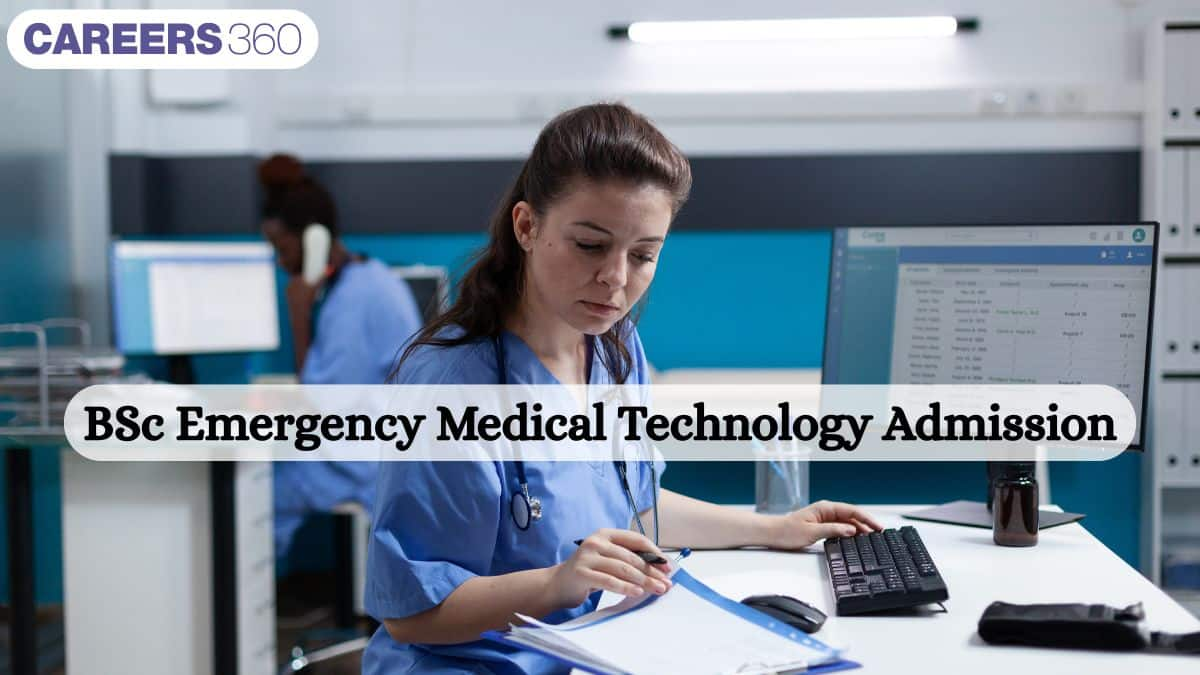INI CET College Predictor 2025
Predict admission chances in AIIMS, JIPMER, PGIMER & NIMHANS Campuses
The Bachelor of Science in Emergency Medical Technology course is a good option for students who are interested in the medical field. Students must fulfil the eligibility criteria to get admission in the BSc Emergency Medical Technology course. The BSc Emergency Medical Technology course helps to deeply understand the medical skills of emergency and critical cases. To know more about the BSc Emergency Medical Technology course details, eligibility criteria, admission process, fee structure and other details, read this full article.
This Story also Contains

Candidates seeking admission for the BSc Emergency Medical Technology course can check the key points from the table below.
Particulars | Details |
Course name | BSc Emergency Medical Technology |
Level of the course | Undergraduate |
Duration of the course | 4 years, including 1 year internship |
Eligibility criteria | Candidates must pass (10+2) in science stream with PCB or PCMB |
Admission process | Entrance exam/ Merit based/ Interview |
Job roles | Clinical Investigator, Emergency physician, Critical Care Technician, Disaster management agencies |
Average salary | Rs 2.50 to 10 lakh per annum |
Also Check:
The BSc Emergency Medical Technology is a four-year program that includes a one-year internship. The program mainly focuses on the field of health care and urgent aspects of injury affecting patients. The BSc Emergency Medical Technology course includes the core subjects are Microbiology, Medical Psychology, Trauma Emergencies, Patient Communication and Care, and Emergency Department Equipment. After completing the BSc Emergency Medical Technology course, graduates may also find opportunities in private clinics and government hospitals in various roles such as
Research Associate
Flight Paramedic/Nurse
Critical Care Technician
Medical Educator
Emergency Room Technician
Disaster Response Specialist
Students must fulfil the eligibility criteria before applying for the BSc Emergency Medical Technology admission. The basic eligibility criteria are mentioned below
Candidates must have passed plus two or an equivalent examination from a recognised board.
To qualify for the examination, students must score at least 50% in the science stream includes Physics, Chemistry, and Biology.
Candidates must be a minimum of 17 years of age and a maximum of 30 years of age on or before a specific date as mentioned by the college /institution. The maximum age may vary depending on the colleges.
Students must check the official website of colleges offering BSc Emergency Medical Technology admission.
Check the BSc Emergency Medical Technology admission eligibility criteria from the college’s official website.
To register, candidates enter their name, email address, contact number, and other information.
Fill out the application form of the BSc Emergency Medical Technology admission with educational qualification, contact details and to upload the other necessary documents.
Pay the application fee.
Submit the BSc Emergency Medical Technology admission application form and take a printout as same for future reference.
Candidates who are registered and have submitted the BSc Emergency Medical Technology application form will have to appear for an interview or entrance exam.
Some institutions may conduct entrance exams like NEET-UG (for integrated courses), CUET, MET Exam, while others are focused on merit-based admissions.
To check the BSc Emergency Medical Technology admission dates, visit the official website of the particular college.
Once the seat is confirmed, candidates have to pay the BSc Emergency Medical Technology course fee and submit the required documents.
The BSc Emergency Medical Technology fees vary in government colleges and private institutes. The BSc Emergency Medical Technology fee structure can be checked from the table below.
Type of college | Annual fees |
Government colleges | Rs 50000 to Rs 100000 |
Private colleges | Rs 150000 to Rs 550000 |
Numerous colleges offer BSc Emergency Medical Technology course in India. Students can check out some of the top colleges offering the BSc Emergency Medical Technology course from the table below.
Name of the college | BSc Emergency Medical Technology fee structure |
Rs 1,61,200 per year | |
Centurion University of Technology and Management - [CUTM], Bhubaneswar | Rs 95,000 per year |
Saveetha Institute of Medical And Technical Sciences - [SIMATS], Chennai | Rs 1,25,000 per year |
Rs 3,92,000 total fees | |
East Point Group of Institutions - [EPGI], Bangalore | Rs. 4,06,500 total fees |
Rs. 3,500 per year | |
Rs. 1,28,450 per year | |
Rs. 1,16,600 per year | |
Rs. 1,10,000 per year | |
Rs. 1,42,000 per year | |
Rs. 4,19,000 total fees |
Ranked #18 by NIRF, NAAC A++ Accredited | Unmatched clinical exposure with over 7 lakh patients yearly
Check your expected admission chances in MD/MS/Diploma courses based on your NEET PG Score
Allied & Healthcare programs | 20+ Partner Universities & Institutes | 98% placement record
Your one-stop NEET PG counseling package with complete hand-holding throughout the admission journey
Get Job-Ready with New-Age Allied Health Programmes
Get Job Ready in Healthcare | Employability-Focused Programs